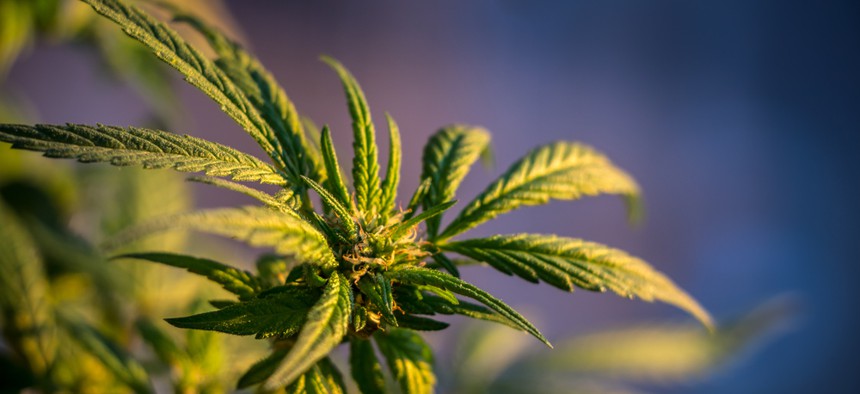
Atomazul/Shutterstock.com
Are Organizations With Drug Tests Weeding Out Great Candidates?
More than half of Americans report that they have tried marijuana. What does this mean for zero-tolerance workplaces like the FBI?
The FBI's jobs page makes it pretty clear how the agency feels about marijuana: "You can easily determine whether you meet the FBI's illegal drug policy by answering the following questions." The list's first question: "Have you used marijuana at all within the last three years?"
Government agencies are some of the strictest of employers when it comes to drug testing. The CIA's policy, for example, prohibits marijuana use in the previous 12 months, but any prior drug use is "carefully evaluated."
Yet news that the FBI might be having a hard time recruiting cyber-security experts due to a strict "no marijuana" rule raises the question of how applicant pools will be affected by the growing popularity and legalization of marijuana. Last year, FBI chief James B. Comey made comments that the bureau might loosen the rules to recruit hackers, though he later backtracked. And one police force in Idaho said that its recruitment efforts are set back by its own drug policy, which mandates that anyone who has used marijuana in the past three years can't be hired.
With nearly half of Americans reporting that they have tried marijuana andmore than a third of college students having used it in the last 12 months, any organization—in the public or private sector—with strict anti-marijuana policies could be missing out on a significant portion of the talent pool.
The wave of legalization that has spread across the U.S.—marijuana is legal for recreational use in Colorado, Washington, and the District of Columbia, with Alaska and Oregon set to join them in 2016—will clash with zero-tolerance drug policies that have been around for decades. With so much cultural inertia behind these policies, it's hard to see that changing anytime soon, even as the percentage of drug tests in the U.S. that were positive rose for the first time in a decade, to 3.7 percent. In Colorado and Washington, positive marijuana rates jumped to over 20 percent after legalization, and yet few major firms in those states are relaxing their drug policies.
"I think their commitment to this policy has been so strong that it’s just really really difficult for them to walk back from it," says Peter Cappelli, a professor of management at The Wharton School, who conducts research focused on human capital in the workplace. "My guess is that they’ll just continue to suffer from it, that it’s harder to hire people, because it’s politically too difficult to explain."
"A lot of the people in these big corporations can’t quite get their heads around this—the fact that marijuana is legal. Because they made such a commitment to zero-tolerance drug testing," says Cappelli. "I think more generally it’s this cognitive dissonance problem."
It doesn't help that federal and state laws are frequently at odds. "That’s the big quandary, a lot of companies are scratching their heads," says Thomas Ryan, lead researcher for workers’ compensation market at Marsh, advises businesses on risk management. Ryan explains that marijuana legalization affects a wide range of considerations for employers including worker's compensation, liability issues, and termination policies. For example, worker's compensation can be denied if an employee is injured at work while intoxicated. In states where recreational use is legal, termination due to a positive drug test, while legal, could be tricky—it might require further evidence that the employee was impaired while at work. (This is all in addition to the ongoing debate about whether employees should bedrug tested at all.)
The ways in which companies have adapted—or failed to adapt—their hiring policies in response to the legalization of medical marijuana have shown how fraught hiring processes might become after widespread legalization. Since 1996,twenty states have passed laws legalizing the use of medical marijuana, but even in legalized states, employers can enforce zero-tolerance policies in the workplace. The case of Brandon Coats, who is currently awaiting the result of his Colorado Supreme Court case on being fired from Dish Network for using medicinal marijuana, highlights this tension.
"In states with strong disability or medical marijuana laws, penalizing medical marijuana users when they are not impaired could be a huge legal and political issue," says John Sullivan, a professor of management at San Francisco State University. "With more jurisdictions being added, human resources leaders can no longer postpone updating their drug, alcohol, and impairment policies and methods of testing and enforcement."
As marijuana appears to shift further and further toward mainstream acceptance, Cappelli suspects that employers that are having trouble hiring because of strict drug policies will ease up enforcement, quietly taking them off the rulebook when the political climate is right.
Some agencies already treat marijuana differently from other Schedule I drugs: For example, police recruiting in New Orleans will disqualify applicants for the use of any illegal drug within the 10 years prior to application. With marijuana, it's only two years.
Thomas Ryan also suspects that companies phasing out strict drug policies will do so quietly. “There are the very verbal, vocal, communicative employers that will say, 'We have a zero tolerance policy in-house that’s enforced,'" explains Ryan. "And the alternative would be that there wouldn’t be any mention of it at all." Although relaxed marijuana policies could be used to draw young and creative candidates, few companies appear to be using this tactic yet. For now, it looks like companies are choosing to play it safe—or at least play it quiet.
(Image via Atomazul/Shutterstock.com)






